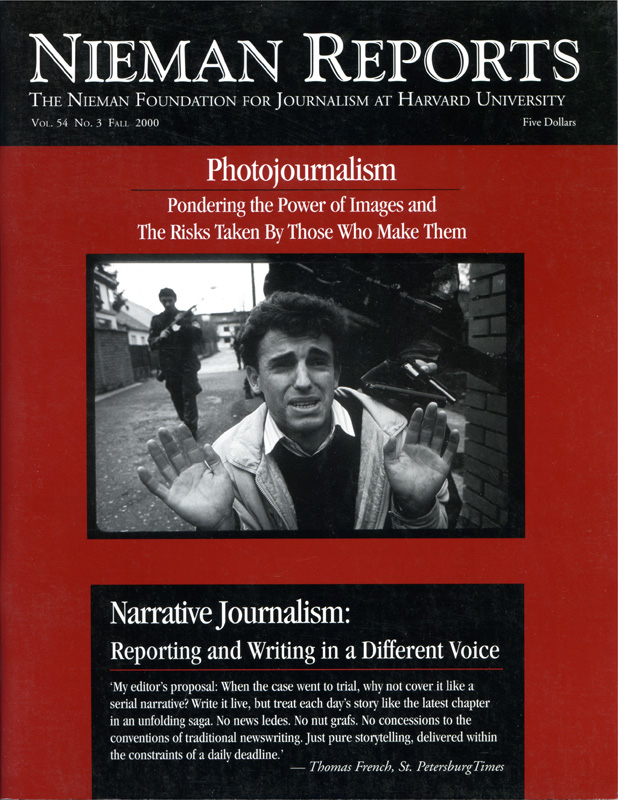They never met. Megan Kay Scott was entering grade school when Howard Simons ended his legendary career as managing editor of The Washington Post and became Curator of the Nieman Foundation. Yet, like the many journalists whose careers Simons influenced before his death in 1989, Scott will benefit also from the editor’s reputation for nurturing young talent.
This fall, Scott, a recent graduate of Clark Atlanta University, will pursue a master’s degree in journalism as a recipient of the newly created Howard Simons Graduate Fellowship to the University of Maryland. The Washington Post initiated the Howard Simons Scholarship and Fellowship program last year as part of an education partnership with the university’s College of Journalism. Each year, two outstanding minority students will be awarded a graduate fellowship and an undergraduate scholarship.
Scott, who has dreamed of a writing career since childhood, already understands that the business of journalism requires commitment. Her credentials include internships at The Boston Globe and The Detroit News, reporting and editing experience, and an award for editorial writing. “I’ve always believed in doing the maximum, not the minimum,” Scott said. “The fellowship involves a lot of hands-on experience. In journalism, that is one of the best ways to learn, and I’m really looking forward to it.”
Like Scott, Simons was passionate about journalism. His enthusiasm was matched only by his endless efforts to develop, encourage and challenge good journalists. In fact, the program named in his honor is part of the newspaper’s three-year-old Young Journalists Development Project, which was designed to support students interested in newspaper careers and to encourage more minorities to enter journalism.
In the Simons tradition, the development project has guided young journalists with help from an extensive network of volunteers from The Washington Post’s news staff. In addition, it has allowed the newspaper to assist students in the District of Columbia, Maryland and Virginia through writing seminars, equipment donations, and technical assistance. The program helped revive a number of the District’s high school newspapers.
As the Young Journalists Development Project expanded to include college level education partnerships, it became clear that financial assistance could play a key role in attracting talented journalists, said Dorothy Butler Gilliam, the project’s director. “Lack of funding for higher education often had been cited as a barrier to minority enrollment,” she said. Financial assistance for University of Maryland students became one way of addressing that barrier.
Lolly Bowean—the first Simons’ graduate scholar—concentrated on public affairs reporting and spent a semester of reporting work at the Capital News Service. She took classes taught by Gene Roberts, former Philadelphia Inquirer editor and New York Times managing editor, and Haynes Johnson, a former Washington Post columnist.
Bowean praised the program’s professors for giving her a new appreciation for the power inherent in great journalism. “Before the University of Maryland, I thought of journalism as a job—a good one that I loved, but a job,” Bowean said. “They showed me how journalism has the power to change things, to make things better….”
Simons certainly understood the power of the press. He received the first telephone call about a break-in at the headquarters of the Democratic National Committee and later managed the coverage of what became widely known as Watergate, the biggest story in the newspaper’s history.
But even as he pushed reporters to pursue the big stories, Simons also emphasized that the reporting had to meet the high standards he valued—fairness, completeness and evenhandedness.
When the newspaper celebrated the new Simons awards during a gala reception last year, a program note explained the designation: “The scholarship and fellowship are named for Howard Simons because he embodied the attributes The Washington Post values most: a relentless drive for the truth, a nurturing and inclusive presence, a reverence for the language and—above all—a sense of fun.”
When Katharine Graham, chair of the executive committee of The Washington Post, addressed the gathering, she referred to Simons as a “brilliant writer and editor” who had “stood for the best in our profession.” She continued, “Thanks to this program, I feel sure his influence and his standards will endure in journalism—and in journalists—for many generations to come.”
Marcia Slacum Greene is a special projects reporter at The Washington Post and a 1991 Nieman Fellow.


